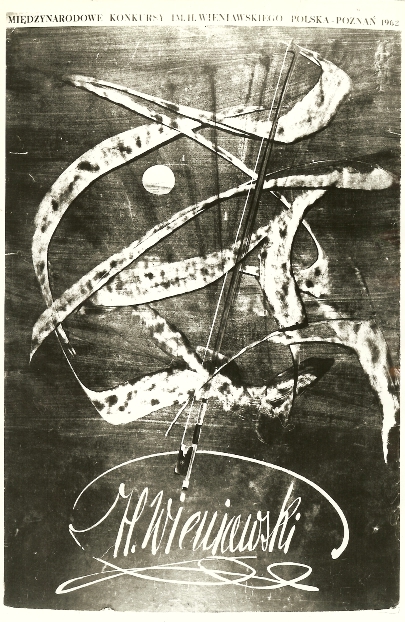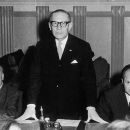4th International Henryk Wieniawski Violin Competition
Poznań, 4-18 November 1962
Watch a documentary about the competition:
Having so beautifully bidden farewell to Poznań in 1957, this time, to greet the participants of the fourth edition of the Wieniawski Competition, David Oistrakh sent a telegram from his US tour. It was read in the auditorium to enthusiastic reception of the audience just before the first contestant took to the stage. The first player drawn to perform in the Competition was the then newly-graduated artist, Jadwiga Kaliszewska from Poznań. And what a lucky draw it was; having finished the competition with distinction, she then devoted almost half a century of her work as educator, juror, and organizer to the Wieniawski Competitions. She also held chairmanship of the Henryk Wieniawski Society in the 1992-1997 term. For the Society, the 1962 edition was the first exam in organizational and artistic skills. Today we know that it was its authors’ vision and imagination, as well as down-to-earth arguments that made the undertaking successful, as at the turn of the 1950s and 60s an avalanche of disputes about the “Wieniawski’s” place rumbled through the corridors of power, the cultural circles, and the media. Not everybody liked the idea of the Competition not returning to the capital. Michał Spisak, who lived in Paris, wrote to Grażyna Bacewicz in June 1960: “You are telling me about the problems with the Wieniawski Competition. Naturally, it would be better to hold it in Warsaw. After all, Poznań has its annual international fair [...]. It is only natural that the Wieniawski Competition should be given the same or similar splendour as the Chopin Competition. Furthermore, the Jacques Thibaud — Marguerite Long Competition is held in Paris, not in some large provincial town”. He was to use the same “fair” arguments later (December 1960), in a letter to Eugenia Umińska. However, it did not prevent the illustrious composer from submitting a composition to the Second Henryk Wieniawski International Composer Competition (1962) held “in some large provincial town” and walk away with the Second Prize (the First was not awarded).
The undisputed winner of the subsequent, fourth violinist contest was the American Charles Treger. He managed to reconcile the verdict by members of the jury with this of the audience, whose younger members for the first time (and so far, the last) expressed their delight by carrying their hero from the auditorium on their shoulders. Although the 27-year-old artist and mature virtuoso (with over 700 appearances under his belt) was already Professor at the Iowa Conservatory, he was pleased as Punch with his success. His joy was perhaps greater than when he performed Wieniawski’s Concerto with the orchestra at the age of 11. When he wrote about it in the competition questionnaire, he said that “the Same Charles Treger” had for long been familiar with Wieniawski. Interpreters overlooked this case subtlety and from then on, in almost all press reports, the no. 1 hero of the 1962 Competition was referred to by two first names: “Same Charles”. Other laureates were a little overshadowed. The Ukrainian, Oleh Krysa (Second Prize), and Pole, Krzysztof Jakowicz (Third Prize), then very much unknown, today attract music-lovers to concert halls around the globe. Charles Trager in turn, hundreds of domestic and international successes later, has nowadays mainly concentrated on work with his countless alumni. However, on his webpage he still emphasizes his 1962 Polish victory, as well as remembers the congratulations he received from President John Kennedy; in the image section, a prominent place is taken by a photograph in which he is showing the Poznań Diploma to his wife and two daughters.
source: R. Połczyński, Da Capo. 75 lat Międzynarodowych Konkursów im. Henryka Wieniawskiego
Read more about the 4th Competition (PDF, 688 KB) >

A poster of 4th edition of Wieniawski Violin Competition designed by A. Jeziorkowski.
JURY
MEMBERS
Chairman: Zdzisław Górzyński (Poland)
Władimir Awramow
(Bulgaria)
Igor Bezrodnyj (USSR)
Irena Dubiska (Poland
)
Fritz Ehlers (GDR
)
Jean
Fournier (France)
Denes Kovacs (Hungary)
Georges Manoliu (Roumunia)
Marija
Mihailovič (Yugoslavia)
Louis Persinger (USA)
Alexandr Plocek (Czechoslovakia)
Remy
Principe (Italy
)
Edward Statkiewicz (Poland)
Emil Telmanyi (Denmark
)
Eugenia
Umińska (Poland
)
Tadeusz Wroński (Poland)
PRIZE WINNERS
1st prize: Charles TREGER
(USA)
2nd prize: Oleh KRYSA
(USSR
)
3rd prize: Krzysztof JAKOWICZ (Poland
)
4th prize: Isabella
PETROSIAN (USSR
)
5th prize: Miroslav RUSIN
(USSR), Priscilla A.
AMBROSE (USA)
6th prize: Tomasz MICHALAK
(Poland)
Awards: Andrzej Siwy
(Poland); Aleksander Arenkow (USSR); Antoine Goulard (France); Evelio
A. Tieles (Cuba);
Jadwiga Kaliszewska (Poland)





















